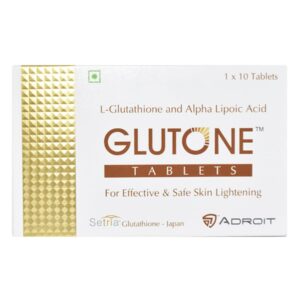ALPHALIPOIC ACID + L-GLUTATHIONE
Alphalipoic Acid: Alphalipoic Acid, also known as thioctic acid, is a naturally occurring compound found in the body. It serves as a cofactor for several enzymes involved in energy metabolism. Alphalipoic Acid has antioxidant properties and is known for its ability to regenerate other antioxidants such as vitamins C and E, glutathione, and coenzyme Q10.
Alphalipoic Acid is mainly used as a dietary supplement and is believed to have various health benefits. It is often used to improve nerve function and alleviate symptoms of diabetic neuropathy. Additionally, it may help enhance insulin sensitivity and regulate blood sugar levels, making it beneficial for individuals with diabetes. Some studies also suggest that Alphalipoic Acid may have a protective effect on organs and tissues, including the liver and the cardiovascular system.
The exact mechanism of action of Alphalipoic Acid is not completely understood. It is known to possess both antioxidant and anti-inflammatory properties, which may contribute to its therapeutic effects. Its ability to improve insulin sensitivity is thought to occur through the activation of an enzyme called AMP-activated protein kinase (AMPK), which regulates glucose metabolism.
The recommended dosage of Alphalipoic Acid varies depending on the condition being treated. Generally, a daily dose of 300-600 mg is common for most uses. However, it is important to consult with a healthcare professional for personalized dosing guidance.
Alphalipoic Acid is generally well-tolerated, and side effects are rare. However, some individuals may experience gastrointestinal symptoms such as nausea, vomiting, or stomach discomfort. In rare cases, allergic reactions, including skin rash or itching, may occur. It is also important to note that Alphalipoic Acid may interact with certain medications, such as drugs used to treat diabetes, so it is important to discuss its use with a healthcare provider.
Overall, Alphalipoic Acid is a dietary supplement that has gained attention for its potential health benefits, particularly in the management of diabetic neuropathy and blood sugar regulation. It is important to speak with a healthcare professional before starting any new dietary supplement to ensure its safety and appropriate use.
L-Glutathione: L-Glutathione is a naturally occurring antioxidant in the body that plays a crucial role in maintaining cellular health. It is commonly used as a dietary supplement to support the immune system and promote overall well-being.
The primary mechanism of action of L-Glutathione is its ability to scavenge free radicals and protect cells from oxidative damage. It also plays a role in detoxification by binding to toxins and facilitating their elimination from the body. L-Glutathione is involved in various physiological processes, including the synthesis and repair of DNA, protein synthesis, and enzyme activation.
The recommended dose of L-Glutathione varies depending on the individual and the specific health condition being addressed. It is usually available in capsule or tablet form, with typical daily doses ranging from 250 to 1000 milligrams.
While L-Glutathione is generally well-tolerated, it can cause some side effects in certain individuals. These may include gastrointestinal discomfort, nausea, and allergic reactions such as rash or itching. Individuals with known allergies to L-Glutathione or any of its components should avoid using this supplement. It is always recommended to consult with a healthcare professional before starting any new dietary supplement, especially if you have any underlying medical conditions or are taking other medications.
It’s important to note that L-Glutathione is not a miracle drug and its effects can vary depending on the individual. Some people have reported improvements in skin complexion and brightening effects, leading to the use of L-Glutathione for skin lightening purposes. However, the efficacy and safety of using L-Glutathione for skin lightening purposes are still under debate, and it is essential to consult with a dermatologist or healthcare professional before using it for this purpose.

